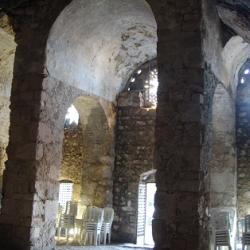Hi and welcome back! Lately, we’ve been talking about how the idea of Hell began and how it changed in early Christianity. We’re now up to the momentous 4th century, when Christianity underwent a whole lot of big shifts. Today, let me introduce you to Augustine of Hippo — and show you how he completely changed the entire Hell game for good.

(Previous Journeys Into Hell: Hell in the 4th Century; 2nd-4th Century Thoughts on Hell; Hell in Early Christian Writings; The Night My Fear of Hell Died; But WHICH Hell Shall We Fear; Why Hell Fails as a Christian Threat; We’re Made Out of Meat; Why Hell Succeeds as a Threat; Dealing With Hell Disbelievers; A Brief Prehistory of Hell. Instead of BC and AD, many historians now prefer BCE and CE — “before the Common Era” and “Common Era,” respectively. (Likewise, “c.” means “century.”))
Everyone, Meet Augustine of Hippo.
Augustine of Hippo, also called Saint Augustine, was a theologian and bishop in Numidia. He was born in 354 CE and died in 430 after a long life of Christian leadership and education flowing in both directions.
By the time he came into the world, Christian leaders had just recently settled into their newfound dominance of much of the world. He lived in a world that only saw Christian leaders gain more and more power over others with every passing year, finally becoming the literal only legally-allowed religion in the Roman Empire in 380.
And Christians in just about every branch of Christianity revere Augustine of Hippo as one of the most important people in the entire history of their religion.
Augustine wrote a lot of stuff that became canonical in Christianity. He wrote about doctrines, Trinitarianism, world history recast as a massive battle between Yahweh and sin (The City of God), and what is quite possibly the coolest name ever for any book ever devised: Enchiridion on Faith, Hope and Love. (“Enchiridion” just means a handbook of essential information. But it’s still beyond cool-sounding.) He brought to the religion a deep appreciation of Neoplatonism, a philosophy that fit in well with the new faith’s ideas.
The Catholic Church still affirms a lot of his ideas, and we see hints of them everywhere.
It’s a real shame, though, that most Christians today have long forgotten his strong rebuke to science-denying Christians who make their religion look ridiculous to learned non-Christians.
Augustine and the Problem of Evil.
The “Problem of Evil” asks why a loving, all-powerful god could possibly ever allow evil to exist in our world. The “Problem of Hell” operates along similar lines, as you might guess. They’re dealbreakers for the religion. If Christians’ claims are true, then these problems shouldn’t exist. But these problems do exist, which sure makes it seem like those claims aren’t true.
These are called capital-P “Problems” because literally no Christian has ever come up with a satisfactory and reasonable response that clears their theology and sufficiently answers the question.
That said, they’ve sure come up with a lot of answers that aren’t satisfactory at all. The field of study wherein Christians try to reconcile Hell and evil with their beliefs is called theodicy.
And Augustine, in his theology, tried very hard to answer the Problem of Evil. He went in a direction modern Christians will find quite familiar: he blamed the existence of evil on humans’ free will. Previous theologians like Irenaeus and Origen (we talked about him a lot here) tried to argue that without exposure to evil, humans couldn’t develop correctly.
But Augustine said that his god had had nothing at all to do with evil’s arrival into the world. Evil, to Augustine, isn’t a force in its own right, but rather just the absence of good. Original Sin — the innocent mistakes of Adam and Eve, made before they even knew what good and evil even were — had opened the door to evil.
Ever since then, in Augustine’s theology, humans commit evil deeds because our spirits are sinful. Evil springs forth from the corruption of our spirits.
Augustine on Hell.
Accordingly, Augustine felt that Hell is a physical and real place, and that humans go there after death as a punishment for not accepting Christianity. To Augustine, salvation is a choice that humans make — or refuse to make. If people do not choose salvation, then they are in effect choosing an eternity of torture in Hell.
But things are a bit more complicated than just that.
See, in Augustine’s view humans can’t resist sin. Our spirits, corrupted utterly without Christianity, find sin to be irresistible. Only through the exercising of our free will can we accept Christianity and all its demands, and thus avoid Hell and enter into Heaven after death.
Of course, he thought that even after making the right choice humans will still sin. And that sin still requires punishment and purification. Thus, he imagined Christians going to Hell temporarily to purify them before they can go to Heaven. So Hell, in a sense, operates like a hospital for sin.
(Reminds me of evangelicals, who are fond of calling their churches “hospitals for sinners.” Are they saying their churches are Hell? Cuz I could agree with that.)
Sidebar: For Real Evil, You Need Religion.
This might sound like one of the weirdest Christian ideas ever, but Augustine wrote that unbaptized infants go to Hell and are damned too — but don’t worry! They don’t get treated too roughly.
Seriously.
In his Enchiridion (I just like saying the word — as you’ve likely guessed), Augustine wrote:
Surely, the lightest of all punishments will be laid on those who have added no further sin to that originally contracted. Among the rest, who have added further Sins to that one, they will suffer a damnation somewhat more tolerable in proportion to the lesser degree of their iniquity.
He almost certainly means babies. After all, babies haven’t added any new sins to their Original Sin plate. (He confirms our suspicions in The City of God at the end of Chapter 3.)
Much later, someone summarized Augustine’s position as “unbaptized infants damned, but most lightly.” To me, that sounds like being slightly pregnant. Regardless, it’s still an absolutely morally-repugnant idea.
(Pro-tip: If your religion is totes A-OK with torturing babies to any degree and for any reason whatsoever, and you follow a god who’d ever allow that to happen under any circumstances, know that your religion and god are the bad guys in this equation. No OMG MUH CONTEXT makes this okay. Ever.)
This is exactly what we ought to expect to happen when a Christian takes their doctrinal beliefs to their logical conclusions. Al Mohler showed us the same horrific inflexibility when he got presented with his idolized Bible’s very obvious approval of slavery.
What Augustine Thought Hell Was Like.
Oh sure, Augustine thought Hell involved flames. Of course. He thought the New Testament’s description of “flames” was literally true, though the flames weren’t quite like earthly ones (nor would the people tortured have fleshly bodies like everyone has in life). His ideas sound a lot like the “secret fire” we traced in previous Christian leaders’ writing.
In The City of God, Augustine describes Hell as torture along lines we likely find very familiar. In fact, he sounds downright giddy about that torture:
For in that penal and everlasting punishment, of which in its own place we are to speak more at large, the soul is justly said to die, because it does not live in connection with God; but how can we say that the body is dead, seeing that it lives by the soul? For it could not otherwise feel the bodily torments which are to follow the resurrection.
I gotta say, it’s thoughtful of the Mad Blood God of the Desert (MBGD) to ensure that his future torture victims will feel every one of his cruel ministrations! I bet this idea scared the willies out of 4th-century Christians onward — which is likely exactly why it came to exist as a threat, of course.
According to this Villanova University site, Augustine thought Hell had a large population of tormentees. However, to Augustine the bigger problem faced by the damned in Hell was separation from MBGD. That idea would be chased by many, many theologians to come — including Martin Luther. Since separation in general forms a huge part of Augustine’s thinking, that makes sense from a logical standpoint — but not a practical one. (Sorry, but I’m not feeling lonely and bereft if I’ve just burned myself.)
How Hell Continued to Evolve in Augustine’s Hands.
In these ways, Augustine shaped Hell as a belief. Rather than blaming demons for temptation, he held people responsible for their fates. The MBGD was absolutely not responsible for any of that.

Augustine certainly had flames in his Hell. He certainly taught that Hell represented punishment. Still, he and his fellow Christian leaders didn’t need gruesome threats like they once did. They now had enough temporal power to force people to join them and stick around.
Mainly, Augustine added lengthy justifications for Hell to Christianity’s overall package of Hell-beliefs. He argued that it’d last forever for at least some people. And he blamed people for their own Hellbound status — as improper as that assignment was and is.
If anything, Augustine and his like-minded fellow leaders aimed their threats at those who already believe. They crafted their threats to ensure obedience and compliance. Nobody needed to worry about persuasion. Not for a while, anyway.
Then, Augustine deployed some twisty-turny logic to make it all make sense. Only currently-believing Christians who feel compelled to continue believing could ever accept it.
Tracing the Genealogy of Imaginary Places.
I hope I’ve shown you that Hell has a distinct genealogy. The Hell of Augustine would have been unintelligible to whoever wrote the Gospel of Mark, just as a modern evangelical Christian’s idea of Hell, I’m sure, would likely have been unthinkably strange and theologically nonsensical to Augustine.
Christians’ ideas about Hell change all the time. They always will. No Christian will ever be able to convince any other Christian that their ideas about Hell are flat-out wrong, either.
For that matter, Christians have never agreed as a group about what the afterlife involves. Some Christians still go in for those old ideas about annihilationism and apokatastasis. Others are belligerently hellfire-and-brimstone. When it comes to the question of babies’ eternal fates, you’d think there’d be some gracious slack cut there, but nope! Several different flavors of Christianity disagree firmly about that.
Christians have so much trouble figuring out where they stand on Hell because Hell is not real. There’s no way for them to check their ideas against reality. So all they can do is argue and try to craft a vision of Hell that is so scary that their marks will buy into it with no evidence at all.
It’s like having 2000 years to tell the scariest horror story ever created. I bet anybody could do the same with that amount of time and that many helpers along the way!
NEXT UP: The weird and terrible things that happen because bad people keep assuming that they’re doing bad things in private. Then, we’ll be winding down our Journey into Hell. See you tomorrow!
Please Support What I Do!
Come join us on Facebook, Tumblr, and Twitter! (Also Instagram, where I mostly post cat pictures, and Pinterest, where I sometimes post vintage recipes from my mom’s old recipe box.)
Also please check out our Graceful Atheist podcast interview!
If you like what you see, I gratefully welcome your support. Please consider becoming one of my monthly patrons via Patreon with Roll to Disbelieve for as little as $1/month! My PayPal is [email protected] (that’s an underscore in there) for one-time tips.
You can also support this blog at no extra cost to yourself by beginning your Amazon shopping trips with my affiliate link — and, of course, by liking and sharing my posts on social media!
This blog exists because of readers’ support, and I appreciate every single bit of it. Thank you. <3
Last thoughts: Seriously, I’m outta there the moment a believer chirps, “Oh, our religion says babies only get tortured A LITTLE BIT after death!” If the amount of baby-torture in your cosmology does not equal ZERO, you’re still on the side of humanity’s worst enemy.















